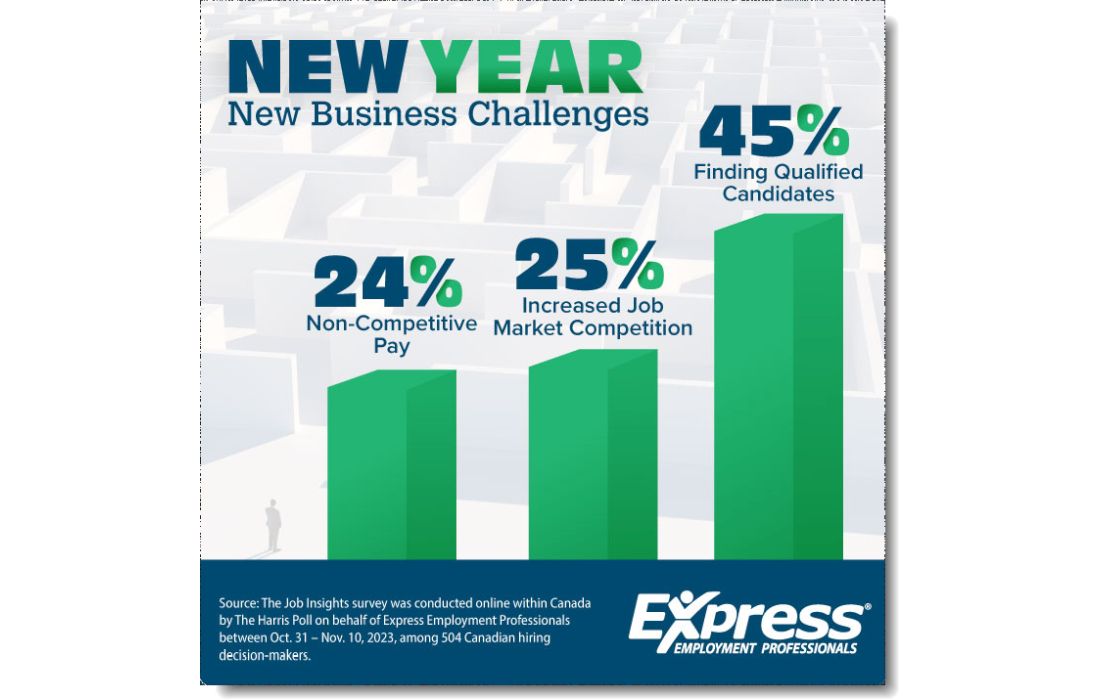I think the thing that employers miss the most when they're posting a job is that it is a marketing strategy – recruitment professional

While half of Canadian companies plan to increase their employee count in the first half of this year, they also expect a litany of hiring obstacles, says a survey from The Harris Poll commissioned by Express Employment Professionals.
The research finds that 89 percent of employers expect to face hiring challenges this year. The most commonly cited obstacle is difficulty in finding qualified candidates (45 percent), followed by increased job market competition (25 percent), uncompetitive pay (24 percent), the available talent pool not matching their needs (23 percent), and uncompetitive benefits (21 percent).

Companies also face increasing salary demands from their existing staff. More than half (55 percent) say their employees have asked for a raise in the past year because of the increase in the cost of living. In response, businesses are proactively making plans to raise wages, with nearly three-quarters (72 percent) reporting they will increase wages in 2024.
Indeed, more than one in three employed job seekers (41 percent) have asked for a raise in the past year (with Gen Z leading the pack at 49 percent). But job seekers are not convinced that raises are coming, as half (49 percent) expect wages to stay the same – with a smaller number (41 percent) expecting their company to increase wages this year.
Employers face persistent skills mismatch
While forecasting and planning for hiring challenges can be beneficial, some ongoing and long-term issues are more difficult to address. For example, the persistent skills mismatch in the labour market continues to plague employers, as more than one-third (36 percent) say they have open positions that they cannot fill.
The main reason these open positions cannot be filled: a lack of qualified applicants – more specifically, a lack of applicants with the required hard skills (45 percent), relevant experience (36 percent), and soft skills (26 percent). Interestingly, employers also note a concern about the general lack of applicants overall (35 percent).
“What stands out to me the most is the 45 percent of companies sharing that their biggest challenge is finding qualified candidates,” says Brent Pollington, owner, Express Employment Professionals Vancouver, BC, a human resources and recruitment firm. “It’s great that more than half of companies are planning to hire people through our office here in Vancouver. They’re not showing a lot of hesitancy or showing any real concerns or challenges or feelings of recession. Everybody seems to be moving ahead full steam and trying to find ways to be profitable in 2024 and 2025 and grow.”
Pollington says his office is receiving a high number of applicants for the jobs it has available. What he finds interesting and concerning is that many of the applicants are not in any way prepared to apply for the position they are responding to.
For example, “we had 139 candidates phone our office and, of those, 130 people didn’t know who we were, didn’t know what services we offer, had never been on our website, and didn’t even know what job they were calling about.
“We get so many people that apply with zero effort or intent in their process, and it's probably the greatest challenge faced by anybody hiring right now. There are great people in the market, but there are a lot of people who don't understand the process that businesses go through.
“There's a lot of complaining from job seekers that businesses are making it really hard and making them jump through hoops. But the reason for that is that businesses have been burned with bad hires and the cost of a bad hire is astronomical these days.
“What we saw out of those 139 people, using our specific example, nine of those people had applied to a job, called to see if their resume had been reviewed, or were asking to see if they could follow up on that process. All nine of those people moved forward in their process and we ended up placing a couple of them.”
“So, when we talk about that skill gap and the challenge of finding qualified candidates, whether they're qualified or not isn't necessarily the challenge. It's the fact that even if they were qualified, they're not even getting a chance to portray that because of how poorly they're showing up on the front end.”
The report shows job seekers say one of the biggest challenges for them is finding job opportunities that match their qualifications (56 percent), including lacking the required hard skills (26 percent), soft skills (13 percent) or communication skills (13 percent) for open positions.
A unique barrier job seekers report is companies that claim to be hiring but are only collecting applicants and resumes to review (34 percent). Gen Z and Millennials are more likely to say this is occurring (72 percent and 70 percent) compared to Gen X and Boomers (54 percent and 53 percent).
Job posting scams driving lack of applicants
A lack of job applicants may also be a side effect of the recent rise in job posting scams. The majority of hiring managers (57 percent) are aware of such scams, but many still are not (43 percent), says the research.
Regardless of awareness, hiring managers seem concerned about the potential impact these scams could have, with close to half (45 percent) concerned about their company name being illegitimately used for a job post scam and many (41 percent) also fearing candidates will avoid applying to legitimate postings because they mistake it for a scam.
The majority of job seekers (57 percent) are also aware of job posting scams, but many also remain unaware (43 percent). Half of job seekers are concerned about falling for a scam (51 percent), especially Gen Z and Millennials (56 percent each). In fact, more than one in 10 job seekers (11 percent) say they have already fallen for a job post scam, while another one in 10 are not sure if they have (nine percent).
Posting jobs is a marketing strategy
Pollington says employers need to post their jobs with intention and build on the organization’s brand and culture if they want to find that perfect candidate.
“I think the thing that employers miss the most when they're posting a job is that it is a marketing strategy,” he says. “They are trying to tap in into a customer base of job seekers that are looking to buy a job. So, they need to look at their company through he eyes of the job seeker. How does the organization show up in the job post? Why is it an amazing place to work? And, what’s in it for the potential candidate?”
A list of 50 bullet points is not going to attract that ideal candidate, says Pollington. “The employer needs to detail the position, but they need to look at the job posting as if it’s a sales and marketing strategy to engage and excite the market to apply for that position. It should communicate the right information so they find the person that aligns with values and culture of the organization.”



